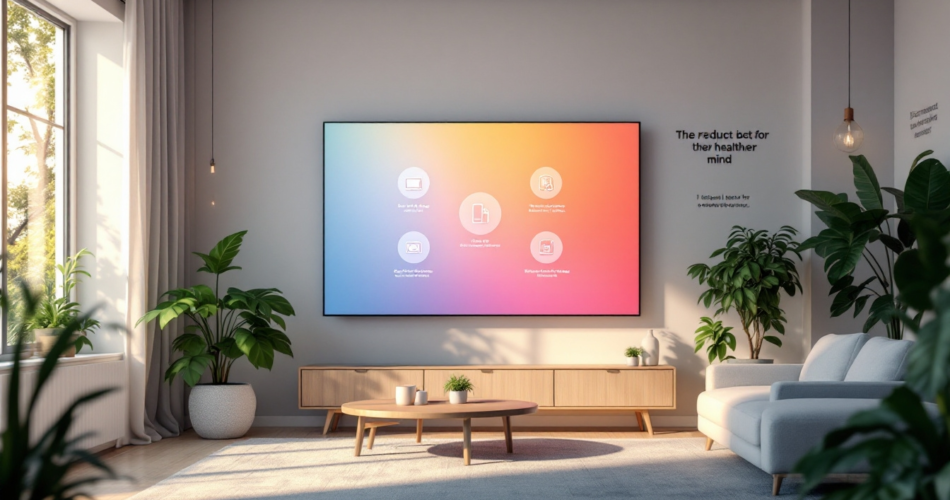Feeling like you’re glued to your screen more than you’d like? You’re not alone. The average person spends over seven hours a day in front of screens, which can wreak havoc on mental health, focus, and sleep. In a world increasingly dominated by technology, finding balance is crucial for overall well-being. Reducing screen time isn’t about abandoning your devices but about recalibrating their role in your life. In this article, we’ll share practical tips to reduce screen time—seven game-changing hacks for a healthier mind and a more focused, peaceful self.
Table of Contents
- Why Reducing Screen Time Matters
- Monitor and Analyze Your Screen Time Habits
- Design a Screen-Free Routine That Works
- Set Boundaries with Apps and Notifications
- Reconnect with Offline Hobbies and Activities
- FAQs About Reducing Screen Time
- Final Thoughts on a Healthier Digital Balance
Why Reducing Screen Time Matters
The Impact on Mental Health: Constant notifications, endless scrolling, and the pressure to stay connected contribute to rising stress and anxiety levels. Excessive screen use reduces your ability to focus and be productive, amplifying feelings of overwhelm. Prioritizing downtime away from screens allows your mind to refocus and recalibrate.
Physical Health Consequences: Spending hours hunched over screens can lead to eye strain, headaches, and posture issues. Additionally, late-night scrolling impairs sleep quality by disrupting melatonin production, leaving you feeling groggy and fatigued the next day. Harvard researchers have highlighted these risks, emphasizing the need for screen-free moments.
Monitor and Analyze Your Screen Time Habits
Use Digital Wellness Tools: Start by assessing how much time you spend on your devices. Features like Apple’s “Screen Time” or Android’s “Digital Wellbeing” can give you a clear picture. These tools show app usage, pickup frequency, and notification counts, allowing you to pinpoint your biggest distractions. Consider downloading productivity apps like Moment, which track your usage patterns.
Set a Baseline: Once you know your habits, identify areas for improvement. Are social media apps hogging your attention? Do you spend hours gaming or streaming? Use this data to establish realistic goals, such as cutting usage by 30 minutes per day. For strategies, check out our guide to auditing your digital habits.
Design a Screen-Free Routine That Works
Establish “No-Screen” Zones: Designate areas where devices are off-limits—such as the dining table or your bedroom. This promotes meaningful connections during meals and improves sleep hygiene by reducing blue light exposure before bed. A screen-free bedroom fosters better rest and relaxation.
Prioritize Offline Time: Schedule non-digital activities into your daily routine. Try reading, journaling, or going for a walk—simple actions that give your brain a break. Incorporate shared activities, like cooking or board games, to strengthen bonds with loved ones while staying unplugged. Psychology Today offers further insights on offline activities that improve well-being.
Set Boundaries with Apps and Notifications
Leverage App Restrictions: Many devices now include app timers that help you curb usage. For extra control, use third-party tools like ScreenZen or Freedom to block distracting apps during productive hours. These solutions are particularly effective for maintaining focus during work or study sessions.
Disable Non-Essential Notifications: Notifications are designed to pull your attention away. Turning off alerts for non-urgent apps like social media or games can minimize interruptions. Alternatively, batch notifications and check them only at set intervals, keeping your focus intact. Learn more about managing digital distractions.
Reconnect with Offline Hobbies and Activities
Rediscover Old Passions: Reignite interests that don’t require a screen. Whether you enjoy painting, knitting, or woodworking, offline hobbies stimulate creativity and help you unwind. Joining local clubs or community groups fosters meaningful, face-to-face connections.
Get Outdoors: Spending time in nature provides an instant mental reset. Activities like hiking, biking, or gardening can break the screen inertia, reduce cravings for digital devices, and improve your overall mood. According to the American Psychological Association, even 20 minutes outdoors can significantly lower stress levels.
Frequently Asked Questions
What are the first steps to reducing screen time daily?
Begin with small changes, like setting timers or designating screen-free zones in your home. Gradually incorporate activities that don’t involve devices, such as reading or exercising. Here’s how to make the transition.
Does reducing screen time significantly improve mental health?
Yes, cutting back on screen use reduces stress and anxiety, enhances focus and productivity, and promotes better sleep habits. Studies by institutions like the Mayo Clinic underscore these benefits.
Are there specific tools to manage or limit screen time?
Absolutely. Apps like Apple’s Screen Time, Freedom, and Moment are effective options for tracking usage and setting boundaries. These tools provide detailed insights and customizable restrictions.
How can I help my kids reduce screen time?
Start by setting a positive example. Create family-wide screen-free zones and involve them in offline activities such as arts and crafts, sports, or outdoor adventures. For younger kids, encourage device limitations with fun incentives.
Is it okay to have screen time during leisure hours?
Yes, in moderation. Leisure screen time can be rewarding and relaxing, but ensure it doesn’t interfere with your physical and mental well-being. Balance it with offline activities for a holistic approach.
Conclusion
Reducing screen time doesn’t mean cutting technology out entirely—it’s about recalibrating your habits to prioritize balance and well-being. By implementing these seven game-changing hacks, you’ll improve your mental clarity, strengthen personal connections, and reclaim control over your daily life. Start your journey today to minimize screen time and maximize a healthier, happier you.


